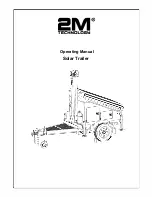
aleo
aleo solar Deutschland GmbH
| Osterstraße 15| 26122 Oldenburg | Germany | service@aleo-solar.com
installation instructions Edition 01/2012 en-GB-Intl (120508b)
Page 35/60
NOTICE
The required minimum length of a clamping
(parallel to the frame side) is 30 mm.
The required minimum depth of a clamping (vertical
to the frame side) is 3 mm. aleo solar recommends
a clamping depth of 5 mm.
Depending on environmental conditions (e.g.
inclination angle, suction load, or margins of the
substructure) a larger minimum surface area per
clamping may be required ([44]).
The clamps already give the actual clamping depth
and clamping length.
Please observe the manufacturer’s guidelines.
Permissible clamping areas
The clamping area permissible for a module depends on the
exact way of mounting.
Fig. 27 Permissible clamping area
c
: clamp length;
d
: clamp depth.
Clamping near the module corner
If the given permissible clamping area for a certain way of
mounting a module extends to the corner, install the clamp in
such a way that it sits fully on the frame of the module:
Fig. 28 Permissible clamping at corners
Clamping at the mounting hole
If the clamping area extends as far as the mounting hole, it is
possible to position the clamp so that its edge sits at the level
of the mounting hole:
Fig. 29 Permissible clamping at the mounting hole
e
: Mounting hole on the module rear side
Do not under any circumstances install the clamp so that its
edge extends over the hole.
9.3.2.
Tightening torque for clamp mounting
Tighten the bolts of the clamps until they are 'hand-tight'. If
using an automatic power screwdriver, set a suitable maxi-
mum tightening torque. More information about this can be
found in the manufacturer documentation for the sub-
structure.
9.4.
Mounting with bolts
aleo modules have pre-drilled holes for mounting that have a
diameter of 9 mm so that the modules can also be fixed with
M8 (5/16 inch) size bolts.
aleo solar recommends using a locking washer and a flat
washer on every side of the module frame. The flat washers
should rest on the module frame and the locking washers on
the bolt head or the nut.
Fig. 30 Bolt connection, diagram
a
: bolt,
b
: locking washer,
c
: flat washer,
d
: module frame,
e
: substructure,
f
: nut bolt.
The bolt connection illustrated above is only for mechanical
mounting purposes. More information on protective potential
equalisation (earthing) with help of bolt connections can be
found in Ch. 8.8.2, 'Earthing with bolts'.
c
d
GID AS015a
GID AS016a
e
GID AS017a
a
b
c
d
e
c
b
f
GID AS018a
















































